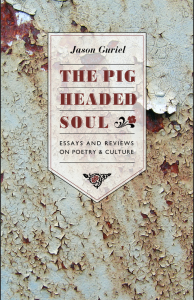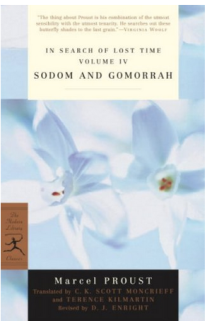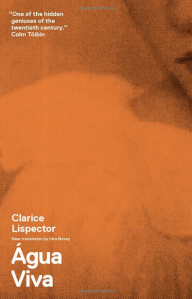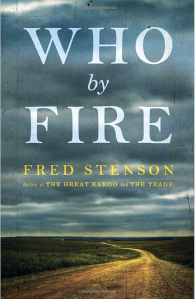Essays and Reviews on Poetry & Culture
Jason Guriel
Porcupine’s Quill
264 pages
I admired the cover of a newly released book on Facebook, and to my surprise I received a copy in the mail from the publisher – no charge, no strings attached.
When the book arrived, I found myself as intrigued by the first few pages of the work as I had been by the cover. This created a dilemma for me. I like to write about books that intrigue me: doing so allows me to engage in conversation about the book – with myself, with other readers and, theoretically, with the author. I read books differently when I know I’m going to write about them – pausing to make notes, to reread paragraphs, to check external references. I wanted to read this book this way, and then to write about it on this blog, but I wondered if I dared.
This was the source of my dilemma: The Pigheaded Soul is a book about poetry – a field in which I have no credentials, aside from my deep and long-standing admiration for well-crafted products of the art form. To make matters worse, this is not a book of poetry (I have dared to write reviews of those before), but a collection of essays about poetry – written by someone who is clearly a well known and knowledgeable poetry critic.
In this country, you are stepping into dangerous territory when you choose to review a book of essays about poetry and culture: it’s bad enough if you are a poet or a poetry critic. How much worse for an outsider? My main blog may be called The Militant Writer, but I’ve got nothing on the more pugnacious members of the poetry cabals: those guys are out for blood, and they (well, at least the more talented writers among them) know how to forge the instruments to draw it. For many years I have watched (some, not all, of) Canada’s poetry elite aim sharply crafted instruments at one another’s throats, and felt the ground shudder from their outrage. They have crazed the literary landscape with their factions. What kind of fool would dare to enter there?
My disinclination to enter the fray had two very different elements. On the one hand, I was fearful that if I agreed or disagreed with a position the book’s author had taken, I might myself become the object of the venom (or, worse, derision) of some poetry camp or other. On the other hand, I was afraid that due to my lack of credentials, no self-respecting poet would even deign to read what I had written, much less take up arms against me: all this work would be ignored. But up through the middle of my indecision came an old friend, rebelliousness: an emotion that has always spurred me into action, even when action was neither wise nor worth the effort.
After all, I asked myself, for whom are all these poets (and hence their critics) writing? Are they writing only for one another? Specifically, are they writing only for others who work in their own immediate poetic milieu (other academic poets, in the main)? Are they not also writing for readers of poetry – for poetry enthusiasts? For people such as me? Why shouldn’t a mere reader, a mere aficionado of good writing, not step into the rarefied world of critiquing poetry – and even of critiquing poetry critics, for that matter?
And so, having judged its cover with no real background in design or art, I now gave myself permission to judge the book despite my lack of background in poetry criticism. If nothing else, I reasoned, what better approach to take to reviewing a book called The Pigheaded Soul than one that was spurred by rebellion?
First Steps
Jason Guriel, a writer of whom I confess never to have heard until his book landed in my mailbox, is impressively qualified for the work at hand. He has published three books of poetry with respected presses (Exile Editions and Véhicule Press), and his writing has appeared in such noted publications as Slate, Reader’s Digest, The Walrus, Parnassus, Canadian Notes & Queries, and The New Criterion. He even won the Editors Prize for Book Reviewing from Poetry in 2009. Someone like this, I decided, was going to be able to teach me a whole lot about poetry.
I was prepared to find that so highly experienced a poet and critic would be talking entirely about poets I didn’t know and poetry issues I had not previously considered. This he often did, but it was with both surprise and relief that I discovered that he also seemed to respect a few poets I’d already found all by myself, and read deeply just because I wanted to, including Weldon Kees, August Kleinzahler, and Elizabeth Bishop. This made me feel more comfortable in the rarefied atmosphere into which I had ventured, and I pressed on with growing courage.
Literary Criticism
It’s not that I come to the world of literary criticism utterly devoid of experience – or prejudice. I have read widely and written many reviews of books, mostly of works of fiction, for newspapers, magazines and journals as well as for my own diversion. Over the past 40 years, I have developed my own principles regarding what constitutes good writing, irrespective of the genre and independent of any particular school of literary thought (either actual or theoretical). They apply not only to everything I read, but to everything I write.
I have long believed that as literary critics and reviewers, we should apply the principles of good writing that we have adopted for ourselves as standards for the books we are reviewing, and be more honest than we typically are. If the emperor (or his would-be successor) is wearing no clothes, we should either look away and say nothing, or – if we are going to speak to the matter at all – we should have the courage in our own convictions to point out that the nobleperson’s dressingperson appears to have decamped.
Guriel concurs. In fact, he says, it has been his willingness to speak his mind that has led to his being invited to write most of the essays in this book, and thus to create the book itself. “In the generally dull world of poetry criticism,” he says, “a remotely sharp judgement will tend to perk the ears of editors who like a little edge, even if some readers elect to call the noise they hear a ‘hatchet job’.”
He names as his mentors the critics who have dared to speak the truth, “seemingly failing again and again to consider the impact their sharp sentences might have on their own careers.” In fact, the perils of writing honest reviews in a small literary community are among the reasons I now choose to maintain this blog rather than writing reviews for pay as I used to do: now, when I have nothing positive to say, at least in public I can choose to say nothing at all.
“Good” Writing
As far as the nature of good writing, I found Guriel uttering rubrics that correspond exactly with my own thinking. In this area, he shows himself to be both inclusive and rigorous.
“The poem,” he says in the essay titled “New-Fangled, Old-Fangled,” “—whether fixed or free, lyric or language, traditional or experimental, name the deadlock – assures the reader that there’s a sound reason for most if not all of its words. Even if it has been channelled by meditation or hallucinogens or randomizing computer programs, the poem will somehow account for the quality of the meditation or give some assurance that the hallucinogens have been well spent or the lines of code well programmed.” I make this same demand not only of poetry, but of prose (both others’ and my own).
In a later essay, Guriel underscores this point with a quote from The Paris Review by Truman Capote: “Call it precious and go to hell […] but I believe a story can be wrecked by a faulty rhythm in a sentence – especially if it occurs toward the end – or a mistaken paragraphing, even punctuation.”
I completely agree with that as well.
I am therefore firmly in his corner when Guriel demands not only talent but signs of diligence in the poetry he favours. He seems intrigued by such questions as “What is a good poem?” and “What is a good poet?” and the answers he proposes often have to do with the way the poet has connected the language – the words themselves – with the purpose of the work. While defending their choices of subject matter (“small objects as good or better than righteous causes”), he challenges poets to keep those subjects firmly in mind as they choose their words, and as they construct the frames on which to place them.
Again and again Guriel opens a poem to show the reader its construction, increasing my admiration not only for Guriel, and (if the poem proves solid) for the poet who made the poem, but also for the discipline (!) of poetry as a whole. Talking about a George Johnston poem, for example, he says, “’War on the Periphery’ is neither pro- nor anti-war, and the tension between the singsong form and the grim, matter-of-fact subject matter stays nice and taut to the very end, like a hangman’s rope.” When I re-read the poem after that commentary – poetic in itself – I am not only enlightened, but delighted to have been shown how to see in a new way.
In the poets and poems he discusses, Guriel demonstrates his openness to both new and more traditional approaches to the writing of poetry, suggesting that the determination of writing excellence must be grounded in the reader’s exploration of the work itself, and is never the sole dominion of any one form or style. He delights in finding in a wide range of types of poetry a precise and perfectly felicitous word or turn of phrase. He is eloquent in his praise of a well-placed line break or a keen metaphor, as here in an essay about the poetry of Ann Carson: “Later, same poem, a ‘videotape jerks to a halt / like a glass slide under a drop of blood’,” a simile Guriel describes as “an incredibly specific sort of analog motion, recorded with the precision of an unblinking aperture.”
The Critic as Teacher
The Pigheaded Soul fulfilled my initial hope that it would introduce me to some poets I hadn’t known before, whose work I could now explore – three examples being Daryl Hine, Greg Ormsby and Kay Ryan. (I have probably just demonstrated the depths of my ignorance of the poetry canon to any informed readers who happen to have read this far. You were warned.) But his praise for the writers he enjoys is explained so specifically and well that it serves as a primer for readers who are eager to know more about how poets do their work.
For example, after describing Hine as “a virtuoso,” Guriel shows us why he has given him that designation. Here, he is talking about a poem called “Don Juan in Amsterdam”:
Hine cuts the near-naïve rhyme of ‘known in/born in’ with the off-rhymes ‘sea’/’say’ and even better ‘crossed’/’creased’, the stanza maturing and souring as it slumps, via the assonance of ‘stained and stale’ toward its exquisitely musty final image. ‘Love-disordered linen’ easily tops my Desert Island list for Best Image of Polluted Canal Water Ever (or Best Image of Soiled Post-Coital Bed Sheets Ever).
(Did I mention that Guriel is also funny? Sometimes he uses this gift for evil – as in an occasionally unkind but very amusing essay he wrote for Maisonneuve about the Griffin Poetry Prize presentations.)
Guriel also offers the less-initiated reader guidance in regard to poetic form, as in a review of a book by George Murray when he says, “A good sonnet usually depends on the strengths of its metaphors, a good metaphor, on a connection between tenor and vehicle that’s surprising (we didn’t anticipate it), but also logical (we could’ve anticipated it —if we’d had the poet’s vision).” Guriel’s exploration, with specific examples, of Murray’s poetic facility in this particular essay is, itself, worth the cover price of the book.
For me, however, the outstanding example in The Pigheaded Soul of Guriel’s beneficence as teacher is a two-page essay called “Travel Writing” in which he unpacks (I hate that word, but it seems less loaded than “deconstructs” in the context of poetry criticism) a single poem by Elise Partridge, “Vuillard Interior.” The essay left me breathless with admiration – at Partridge’s vast poetic talent, and at Guriel’s ability to see, and to brilliantly explain.
One of the intriguing questions with which The Pigheaded Soul has left me, one which I had not really thought about before but will mull as I read poetry in future, is the difference between poems that are created solely to become part of a themed or “concept” book, and poems that stand alone, are self-contained – each one constituting what Guriel describes as “A poem, not just poetry.”
The Critic as Human
Jason Guriel as a critic is not without his flaws. Like others of his kind (the sort to whom I referred long, long ago – i.e., in the opening section of this piece), it seems he cannot resist the urge to sink a knife or two into those whose work he disparages, even when it does not seem necessary or relevant to the subject at hand even to mention them. In his case, many of his victims are those considered icons by half of Canada’s reading public: Al Purdy, Margaret Atwood, bpNichol. He says, and I agree with this on the basis of my extensive experience in the field of fiction-reading, -writing and -critiquing, “Surely we’ve reached a moment when critics who happen to possess a Canadian passport shouldn’t need to feel compelled to gin up more interest in the national poetry than they want to.” Nor am I defending the widespread public worship of these particular poets. Still, Guriel’s targets often seem – at least to me – a little easy: his parries intended at least in part to attract attention. His droll lacerations may produce in the reader a guilty thrill of schadenfreude, but I found myself wondering what other purpose they might serve.
(This is not to say that Guriel is not as eloquent and instructive when he is being negative as he is in his more laudatory moments. In “Godno,” a review of Yesno by Dennis Lee, he says, “… the overstated gap between a word and its meaning may be theoretically valid, but a good poet renders the gap irrelevant,” continuing the thought a few paragraphs later thus: “A reader [at least one not working on a dissertation or working to prop up a ‘beloved’ reputation] is under no obligation to engage with a poem, especially if that poem seems to be standing at a distance from its words, indifferent, paring its fingernails.” )
On the flip side of the same predilection, Guriel drops the names of poets he admires even when the context does not necessarily require that they be present: Robyn Sarah and Christian Wiman are clearly two of his favourites.
. . . and culture
The “and culture” part of the subtitle of The Pigheaded Soul includes two interesting essays on poetry in prose (and the varying success of fiction-writers in creating believable poet characters), and a few that relate to Guriel’s obvious love of offbeat music, including a wonderful piece on Alex Chilton. Here Guriel guides me in an utterly unexpected direction as I find myself not only downloading “Like Flies on Sherbet” for myself and listening to it again and again, but also resolving to share the essay (“A Big Star Implodes”) and perhaps the music with my offbeat-music-loving sons.
.
I’m sure that there are many who will say that the works that Jason Guriel discusses in this book are limited in range, unrepresentative of this or that perspective. I leave that for the poets and poetry critics to sort out. I am not proposing The Pigheaded Soul as the definitive assembly of words about contemporary poetry by any means, but I am declaring myself more than satisfied with this book as my own introduction to the genre.
As for my first (and possibly final) venture into critiquing the critiquers of the poets, there are those who will suggest, no doubt, that too much of this essay has been about me, and my responses to the book, rather than about the book itself and its author. They will also want to point out that no matter how ad-nauseum-atingly endlessly I acknowledge it, my lack of a broad perspective on the poetry firmament precludes their according any real gravitas to my views. To which I respond again: I am a reader. How many of us are there out here who are not poets, but nonetheless read poetry? Probably very few. But I’m sure I’m not the only one. What we think about what the poets and their critics do may not seem to matter, but it should.





